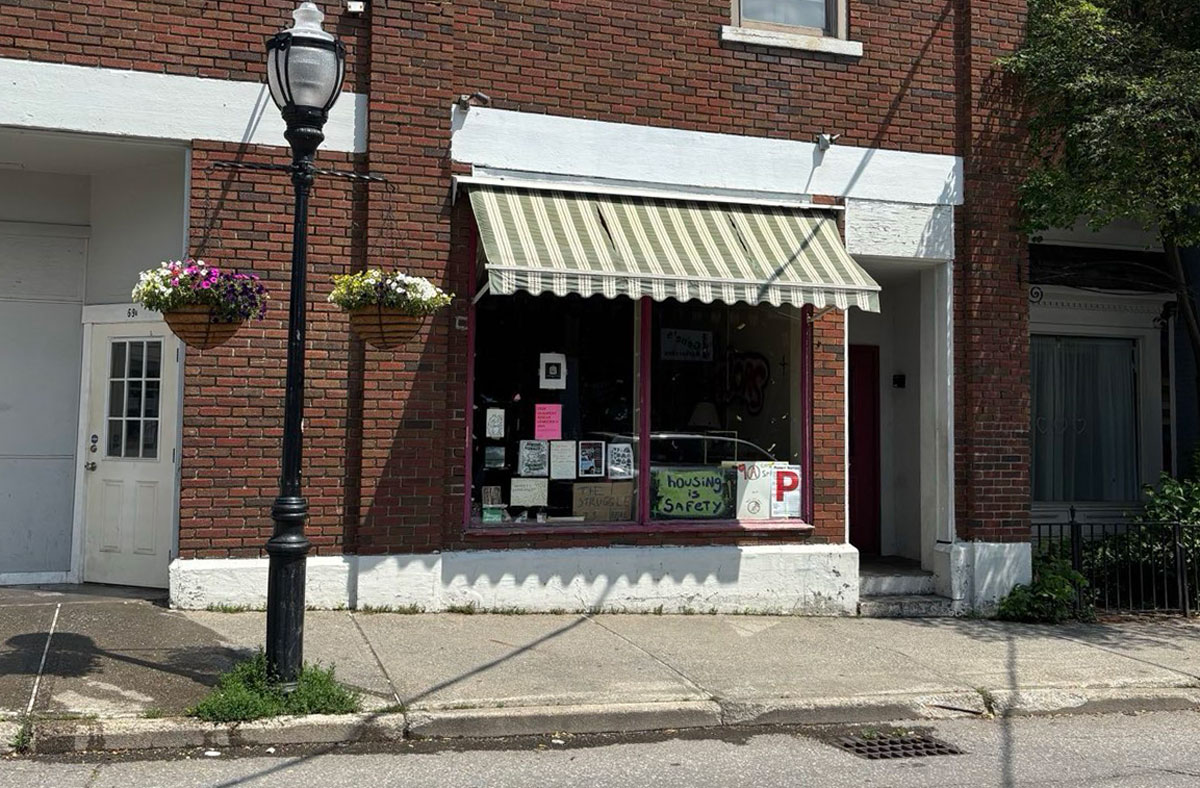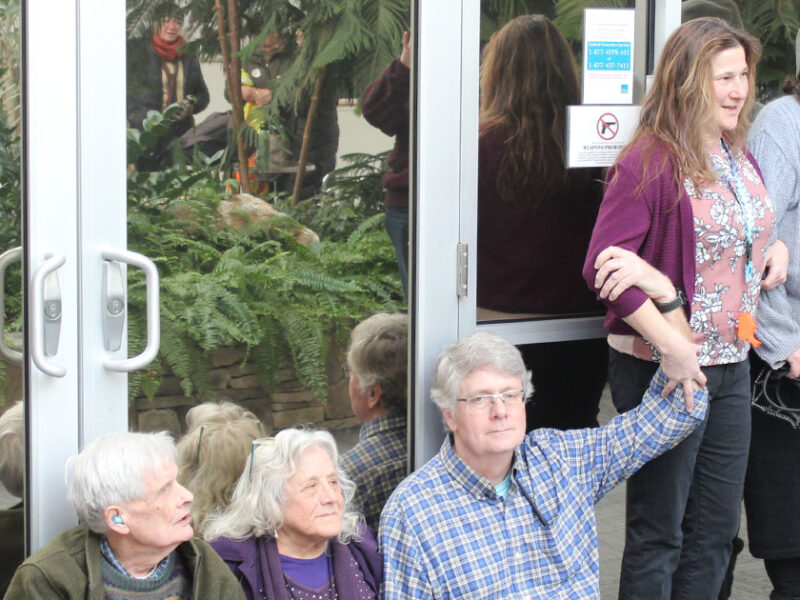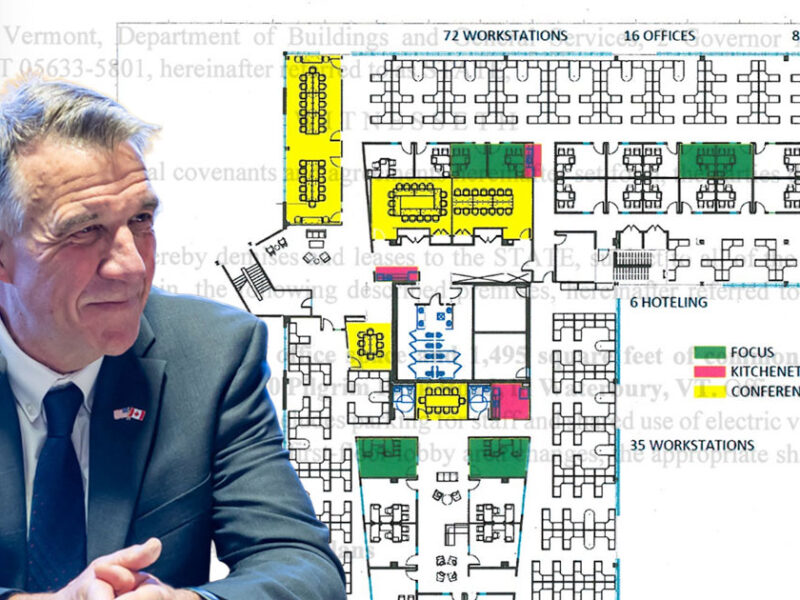69A is a community art and gathering space on Elliot St. in downtown Brattleboro. Originally started in January as a hub for arts events and mutual aid distributions, it has since blossomed into a diverse community center with daily drop-in hours where all are welcome.
The space is the emergent product of the visions and collaboration of two remarkable community members and the tireless contributions of countless more.
“It’s a bit of a mess because we’re all a bit of a mess. We’re just trying to bubble gum and duct tape this place together because that’s what we’re good at,” Lisa Marie tells me with a smile and healthy doses of her trademark humility, directness, and seemingly inexhaustible drive to care for others.
Lisa has been planning for this kind of space for almost two decades. In 2023, she played a significant role in running another space, the “Pop-Drop” (which stands for pop-up, drop-in) on the ground floor of the Brattleboro Transportation Center. The Pop-Drop was a temporary collaboration between the HCRS Peer Support Team, the AIDS Project, Turning Point, and community members like herself to provide a space for connection and resources while Groundworks’ shelter was closed following the death of Leah Rosin-Pritchard.
When the Pop-Drop closed, Lisa proposed ideas for public bathrooms and a more permanent, community-run drop-in space. When those didn’t gain traction with the town government or community groups, she became what some lovingly referred to as “the pop-drop on foot.” She would walk all over Brattleboro, distributing camping gear, grocery and gas cards, and other supplies she gathered through Facebook requests. Largely carrying these tasks alone, Lisa quickly burned out. She moved to a hotel in Montpelier, where she worked as a manager, before returning to Brattleboro this spring.
Just a few days after returning to town, Lisa attended a meeting at 69A, where she met fellow Brattleboro resident Katie Bachler.
With longtime roots in the area and a background in community art projects, Bachler has always looked for opportunities to bring people together. “I see art as a tool to help people learn about each other and connect in ways that are truly open to anyone,” she said.
Bachler and her spouse used to run Avenue Grocery on Western Avenue. She told me that at one point, there were 14 neighborhood groceries in Brattleboro. Avenue Grocery was an effort to revive this tradition. “It was early in the first Trump presidency and we were so divided, but everyone needs milk and eggs,” she said. They sold the business in the fall of 2018 when they were expecting their first child.
Last fall, amid rising division in town and debate over the eventually-repealed Acceptable Community Conduct Ordinance, Bachler saw a deep need for a community space to bring people together. “There’s gotta be something else we can do. What do we need as a community? How can we find each other and see each other?” she said.

Bachler began renting 69A, named after the building’s address on Elliot Street, in January. The initial wave included a variety of community events – movement classes, film screenings, music nights, and art activities – and the space became a hub for a twice-weekly mutual aid distro. These distros, which had been ongoing for months in different downtown locations, brought people together to meet their basic needs for food, supplies, and connection.
On April 17, the Brattleboro Police forcibly cleared an encampment near Exit 1. Soon after, 69A held space for a community conversation about safety and solidarity between housed and unhoused community members.
It was here that Lisa Marie and Katie met. When Lisa shared her ideas for community spaces, Katie felt an instant connection. “It was like, oh my gosh, this is what we were imagining too,” she said.
A week later, they held community art events during May’s gallery walks. Participants were invited to co-create visual art and explore questions about what they needed to belong and feel connected in their community.
When Katie asked what she needed to get the drop-in space up and running, Lisa Marie replied, “I can make it happen. Is it okay if we start on Monday?”
Since May 5th, the space has been open from 10-4 on weekdays, providing food, clothes, supplies, and simply a place to be, all for free. When Lisa Marie arrives in the morning to set up, there is often already a line on the sidewalk.
By early June, there were around 50 people coming through each day. Since the mass evictions from the state’s housing voucher program on July 1st, that number has risen to about 115 and the space has been open seven days a week. Lisa estimates that about a third of the people who come through are housed, with the other two-thirds being unhoused.
In the hour that we spoke on a Friday afternoon, our conversation was briefly interrupted by high schoolers getting set up to paint with watercolors, a neighbor stepping out of the rain to put on a dry shirt, a musician borrowing a fan for a show across the street, and an artist preparing a wall for a new mural. A couple of folks were also napping on the couches.
This mix of people and activities is typical for the space. “There are no boring days here. This is a space used by all sorts of people for all sorts of things,” Lisa said.
In the evenings, the space has hosted teach-ins or workshops on various topics ranging from the Stop Cop City movement in Atlanta, to the Vermont AFL-CIO, to solidarity networks with grassroots organizers in the Philippines. For Bachler, the connection between the daytime drop-in and these more political events is clear.
“These are all struggles to defend life. 69A is what it looks like to defend life in Brattleboro,” she said.
“People really don’t understand how scary it is to be homeless. This is like a mini home,” Lisa Marie said. “People can come sleep on the couch and know they are safe.”
This safety helps create a sense of belonging where people can be themselves, along with the dignity and pride that can come with direct material support. “Someone came in with nothing because everything was stolen from their tent. They had nothing but the clothes on their back,” Lisa said. “Once we got them set up, they said that having new things helped them feel like a human again.”
Soon after the drop-in space opened, Bachler received a call from town officials who had heard complaints that 69A was operating as a safe injection site. For Marie, this sort of judgment is unsurprising. “Brattleboro is a very hobophobic town,” she said.
This is also exactly the sort of disconnection and prejudice that 69A seeks to counter on a human level. “There’s a lot of fear, classism, and judgment. People have fear when they don’t get what something is,” Bachler said. “It’s like, let’s take a moment and try to see people for who they are, to bridge the gap between the ‘I’ and the ‘we.’”
They have also heard skepticism about the need for the space, in light of other drop-in spaces and non-profit resources that exist in Brattleboro. In response, they pointed out some important differences between 69A and spaces run by social service agencies, like how 69A is a peer-run space, and how various barriers can prevent people from accessing other options.
Bachler was also keen to reframe this concern from a question of scarcity to a mindset of abundance. “There should be so many spaces for people to be together in community. This isn’t just to fill gaps from social services. This is a space for all of us to hear each other and find ways forward together,” she said.
In this spirit, 69A organizers are hosting an open house from 4:30-7:30 PM on Thursday, July 17th. They hope to bring interested and curious community members into the space to see how they can become involved.
There are explicit needs in terms of collecting supplies, maintaining the space, and raising donations on Patreon and GoFundMe to cover the rent. As more people find support and belonging here, the community is on the verge of outgrowing its current confines. They are seeking to move to a larger space to rent or, ideally, own, if they are able to connect with enough funding. Whether 69A stays or moves, it’s evident that, for so many in the community, its vision and impact will continue to be felt far beyond its physical walls.
“69A is an ongoing act of care and commoning,” Bachler said. “And I hope we can continue to grow it together. This is for all of us.”
Learn more about 69A on their website.
Jonathan Elwell is an educator, organizer, and writer from Brattleboro.



